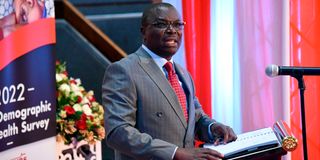Kenya’s economic growth slows amid high inflation

Kenya National Bureau of Statistics Director-General Macdonald Obudho during the launch of the Kenya Demographic and Health Survey 2022 report at KICC in Nairobi on Monday.KNBS data shows that the economy has grown by 5.3 per cent in the first quarter of 2023.
Kenya’s economy slowed in the first quarter of the year, with growth in key sectors weighed down by high inflation, which dampened demand for goods and services.
According to data released yesterday by the Kenya National Bureau of Statistics (KNBS), the economy grew by 5.3 per cent between January and March, a decline in Gross Domestic Product (GDP) growth from 6.2 per cent in a similar period last year.
The reported growth rate is not far from the 5.1 per cent growth rate earlier projected by the Central Bank of Kenya (CBK).
Most key sectors of the economy recorded slower growth during the quarter, compared to the strong growth recorded in a similar quarter last year as economic activity gathered momentum following the full lifting of Covid-19 restrictions.
The largest decline in growth came from the mining and quarrying sector, whose growth plunged to just 3.3 per cent from 23.8 per cent in the first quarter of last year, while that of hotels and restaurants also almost halved to 21.5 per cent from 40.1 per cent.
Other sectors that saw slower growth included manufacturing, which grew by 2 per cent from 3.8 per cent and construction, which grew by 3.1 per cent from 6 per cent.
Electricity, gas and water supply grew by 2.3 per cent, down from 3.2 per cent last year, while transport and storage grew by 6.2 per cent, down from 7.7 per cent.
Information and communication services growth slowed from 9 per cent to 8.7 per cent, financial and insurance services from 17 per cent to 5.8 per cent, and professional and administrative services from 13.1 per cent to 7.3 per cent.
However, the slowdown in these sectors was partly offset by the resurgence of the agriculture, which is the bedrock of the country’s economy. It emerged from a 1.7 per cent recession last year to grow by 5.8 per cent this year.
The wholesale and retail trade sector also recorded improved performance, growing from 4.9 per cent to 5.7 per cent, while public administration improved to 6.6 per cent from 6.2 per cent in a similar quarter last year.
“Growth was largely supported by a recovery in agricultural activities, which grew by 5.8 per cent due to adequate rainfall during the quarter,” the statistics office said.
Despite the slow growth in the quarter, it was the second highest first quarter growth in five years, surpassing the 2.4 per cent, 4.6 per cent and 4.8 per cent growth recorded in 2021, 2020 and 2019, respectively.
“In contrast to the first quarter of 2022, when agricultural production contracted, all sectors recorded positive growth, although the magnitude varied across activities,” KNBS said.
The slower economic growth was underpinned by high inflation, which almost doubled to an average of 9.13 per cent in the first quarter from an average of 5.34 per cent in a similar quarter last year.
Inflation was driven by a sharp increase in food prices due to a severe drought, high fuel prices as the government phased out fuel subsidies, higher electricity prices and new tax measures that discouraged consumption.
The Kenyan shilling also depreciated against most major foreign currencies during the period, slipping, on average, by 11.1 per cent, 6.1 per cent and 0.5 per cent against the US dollar, euro and pound sterling, respectively.
“The Central Bank Rate was revised upwards from 8.75 per cent in February 2023 to 9.5 per cent in March 2023, compared to 7 per cent in the first quarter of 2022,” KNBS added.
Despite the first quarter performance, the National Treasury and CBK are projecting that the economy will grow at a faster pace this year compared to last year. CBK expects GDP to grow by 5.5 per cent this year, a faster growth from the 4.8 per cent growth recorded in 2022.





